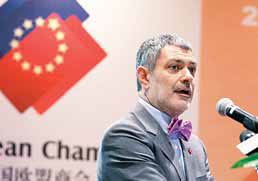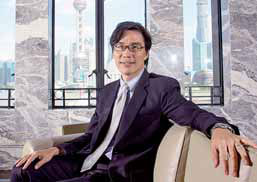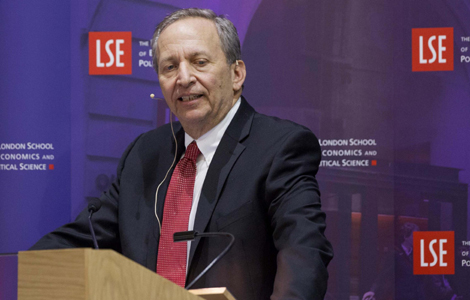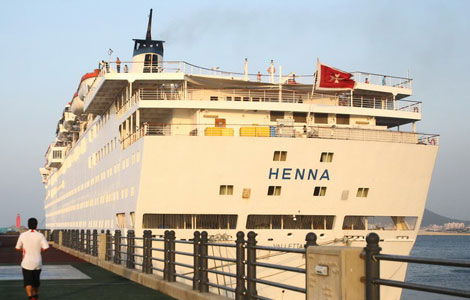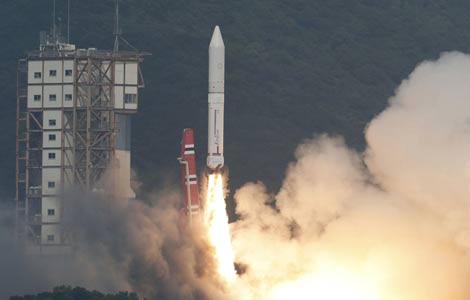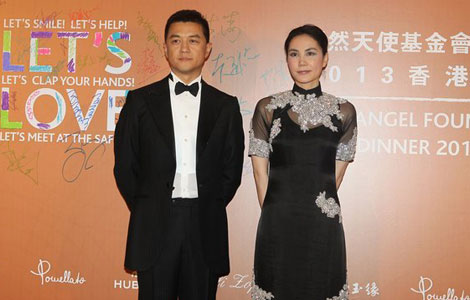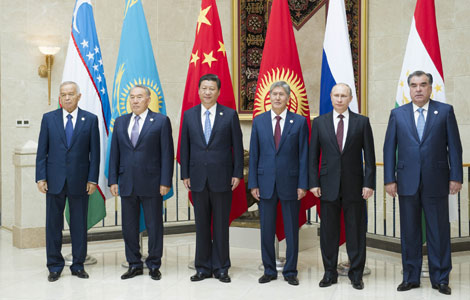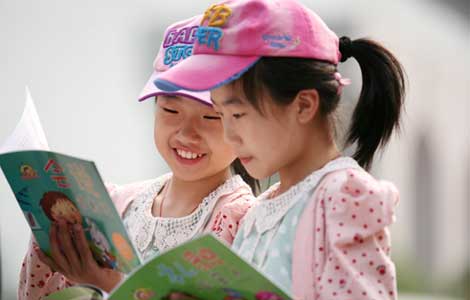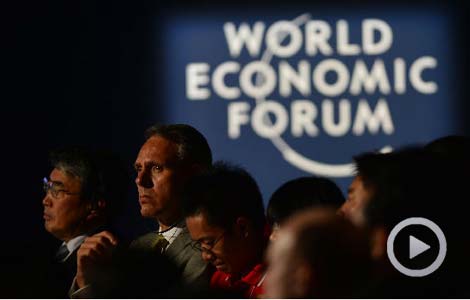Watchdog bites with no favor
Updated: 2013-09-16 08:16
By Meng Jing in Beijing (China Daily)
|
||||||||
Are the dice loaded against foreign companies that do business in China?
Foreign companies are not being singled out for scrutiny in pricing investigations, and recent steps do not pose heightened business risks for enterprises in China, experts say.
However, several organizations such as the European Chamber of Commerce in China feel the dice are often loaded against foreign companies and business risks are steadily increasing in the country.
"In pricing investigations, some of the chamber's member companies believe there is disproportion in how foreign companies are covered on this issue when compared with Chinese rivals," says Davide Cucino, president of the chamber.
Jeremie Waterman, executive director for China policy at the US Chamber of Commerce, the largest US business lobby group, says that although the Chinese anti-monopoly authorities have started several cases against Chinese companies, nearly all large State-owned enterprises have been exempt from enforcement actions to date.
But officials with the National Development and Reform Commission, China's top economic planner, dismiss such charges, saying that "there is no such thing as specially targeting foreign companies. Our investigations focus on monopolistic conduct and not on the entities behind it".
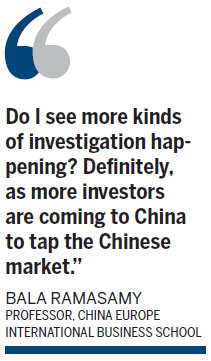
Cucino says fines imposed on dairy suppliers over pricing issues and the bribery investigation into drug manufacturers GlaxoSmithKline and Sanofi have all been blown out of proportion.
However, it is clear that the recent steps have rattled several European businesses operating in China: The half-green, half-red instructional sign at the chamber's Beijing office is not something that is striking. Tucked away in the corner of a meeting room, it is not uncommon now to see company officials poring over the fine print to gauge what is permissible and what is not permissible in China.
The chamber represents about 1,700 European businesses across a vast range of sectors and has 30 working groups, each focusing on issues such as aviation, agriculture and human resources, but it has been the topic of the sign, antitrust and competition laws, that has dominated discussion recently.
"Rather than the green part which lists the 'dos', it is the red 'don'ts' which is being increasingly 'discussed' now by officials," says a chamber official, adding that most of the participants in these discussions are representatives of baby formula and gold jewelry makers, as well as pharmaceutical and automobile companies.
Experts point out that recent inquiries have related to corruption and anti-competitive behavior such as price-fixing. There is little doubt that foreign companies have not been under so much pressure in China since competition laws came into effect five years ago.
"The concern is that even although China doesn't really have a plan to target foreign companies the outcome perception is also important the perception is sometimes as important as the reality," Cucino says.
Despite the concerns and the perceptions, most of the experts say the probes are not directed at multinationals and signify stronger enforcement of antitrust and competition laws in China.
As China moves toward a more mature market-led economy, such investigations are bound to increase, they say, and better law enforcement will help foreign companies to better fix their strategies in China and create a healthy legal system.
Xiaowei Rose Luo, associate professor of entrepreneurship and family enterprise at Insead, one of the world's largest business schools, with campuses in Europe, Asia and the Middle East, says that despite the concerns, the recent investigations are a sign of the stronger enforcement of antitrust laws and deepening market transition in China.
"If you look at the ratio of international firms and domestic firms being investigated, you may get the impression that multinationals have a larger share," Luo says.
"Since the inquiries are a recent phenomenon and the enforcement is getting stronger, it is too early to use the ratio to make such conclusions. I would rather prefer to look at it more qualitatively. Some high-profile domestic jewelry and liquor firms have also been investigated and fined," says Luo, whose research has focused on how unique conditions in emerging economies can affect corporate strategies and performance.
In August, five foreign milk powder makers were fined $110 million by the National Development and Reform Commission for violating contract laws with distributors and for ensuring minimum resale prices. In the same month, authorities imposed fines totaling 10.6 million yuan ($1.7 million) on five local jewelry retailers for price manipulation.
In June, Chinese premium liquor makers Kweichow Moutai Co Ltd and Wuliangye Yibin Co Ltd were fined 449 million yuan for setting minimum resale prices.
NDRC officials say investigations in other sectors are also underway, but refused to be more specific because of the complexity of enforcing anti-monopoly laws.
"Investigations against domestic companies seem to be on a much smaller scale when compared with foreign companies," Waterman of the US Chamber of Commerce says. "This is what we are watching closely. However, we also support China's right to have a strong antitrust regime, because we think it is the basis for modern market-based economies.
"The question now is whether the authorities will use the same yardstick for domestic and foreign companies. This is a big question and we don't know the answer. We have heard rumors that there may be some forthcoming enforcement actions against State-owned enterprises, but we haven't seen it yet."
Bala Ramasamy, professor of economics at the Shanghai-based China Europe International Business School, says that in the 1980s and even 1990s, the foreign investment that came to China was for exports. "In the past, the Chinese government was not too concerned about price-fixing, because the majority of the companies came to China to use the resources, such as labor. The large proportion of what they produced in China was for exports.
"Over the past several years, with the growing market in China, more and more multinationals are beginning to look at the Chinese market. That's why we are going to see more cases involving multinational companies."
The investigations are being conducted to protect the Chinese market and to make sure the Chinese pay the right price for the right-quality products, Bala says.
"Do I see more kinds of investigation happening? Definitely, as more investors are coming to China to tap the Chinese market."
Echoing similar views is James Roy, a senior market analyst with the Shanghai-based Market Research Group. Roy says the Chinese government is under great pressure to provide people the access to affordable prices, and the price differences between the same product being sold in China and other countries have often led to a huge desire among Chinese to buy products from abroad.
Citing an example, he says a basic iPad 2 costs $488 in China, where average per capita income is about $7,500. The same product costs $399 in the US, where average per capita personal income is more than $42,000.
Clothing and other apparel are on average 70 percent more expensive for people in China than in the US, according to data provided by SmithStreet, a Shanghai-based strategy consulting and corporate advisory firm, which compared the prices of 500 items across 50 brands in both countries.
The huge demand to buy genuine high-quality infant formula at relatively low prices has also created an industry named daigou, an Internet-based business in which overseas Chinese act as shopping agents for those who are based in China.
Wang Huainan, CEO of Babytree.com, one of China's largest mother-and-baby online communities, says that whether or not the foreign baby formula companies violate the law or not, the retail price of foreign infant formula sold in China can often be twice that of the same product in other countries.
"Some of the foreign-branded milk is produced locally in China with ingredients imported from home countries, while some others export their final products directly to China. But the tariff China charges on imported dairy products is only about 4 percent of the price, so high tax is obviously not the reason for huge price differences," Wang says.
That means China's domestic baby milk producers raised their prices by about 6 to 7 percent every year, whereas their foreign counterparts raised prices by 10 to 20 percent every year.
However, Roy of the China Market Group says pricing is an important part of a company's branding strategy, so every company should have the right to set their price differently in different countries.
"Our research finds that in many cases people have a lot of uncertainties about what they are buying. Price is often an ideal indicator to show what is good and what is not good. Producers don't charge very high prices, but only what the market can bear."
Peter Wang, antitrust law partner with Jones Day, a Washington-based law firm, says there is no law prohibiting companies from setting their own prices. "However, if we make certain products and you make certain products, it is not OK for us to agree that we keep our price high together. That's what we call a price-fixing cartel.
"Manufacturers are also not allowed to set or fix the selling price they want from customers with their distributors. This is called resale price maintenance. That's the issue that has cropped up in infant formula investigations in China.
"In general, cartels are illegal everywhere with no exception. Retail price maintenance can sometimes be illegal in the US, but enforcement and punitive actions usually are not that stringent and companies can raise appropriate defenses such as that the arrangements are actually beneficial to competition."
Foreign companies have been hit harder by the recent investigations because China wants to enforce anti-monopoly laws and does not want prices to be unreasonably high, Wang says.
Foreign firms are usually high-end companies with more pricy labels, compared with domestic firms. "So when your concern is high prices, then naturally you end up focusing more on multinational companies," says Wang, who has been practicing anti-monopoly law for more than 21 years.
Many of the foreign baby milk producers have cut prices in China after the NDRC investigation. John Ross, senior fellow at the Chongyang Institute for Financial Studies with Renmin University of China and an economic consultant to the mayor of London between 2000 and 2008, says the price reductions show that excess profits existed.
Talking about the recent investigations, Ross says the pharmaceutical industry in particular is prone to corruption in all countries. The consequence of the patent system - wherein a company that can sell its drugs during the patent period may achieve 10 times the price, and extremely high profits, compared with the period after the patent has expired - is a form of limited-time monopoly, he says.
"This creates huge incentives to attempt to achieve rapid sales. High profits during the patent period make corruption economically rational. As this is not a problem confined to China I am even slightly surprised that there have not been scandals of this type previously," he says, adding the investigation is a good sign that the Chinese government is serious about anti-monopoly law enforcement.
mengjing@chinadaily.com.cn
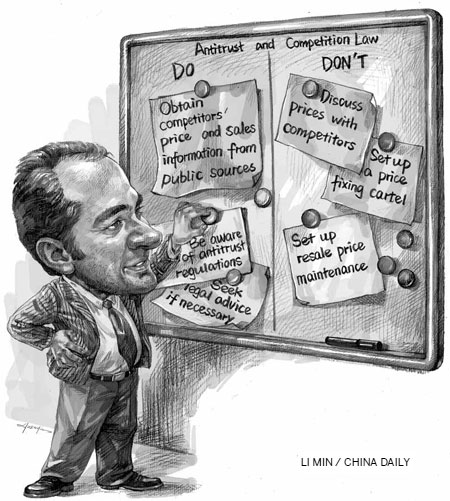
|
Davide Cucino of the European Chamber of Commerce in China has raised questions over inquiries. Wang Jing / China Daily |
|
Peter Wang of Jones Day says the enforcement of the anti-monopoly law is improving in China. Gao Erqiang / China Daily |

(China Daily USA 09/16/2013 page14)
Most Viewed
Editor's Picks

|

|

|

|

|

|
Today's Top News
USDA's OK of chicken processing challenged
US top carpet maker sets up in China
States laud lifting of ban on hardwood by China
UN chief gets report on Syria chemical weapons
Succession proves a tricky art in business
Going global? Not so easy
Japan switches off nuclear reactor
Summers withdraws from Fed chair contest
US Weekly

|

|
